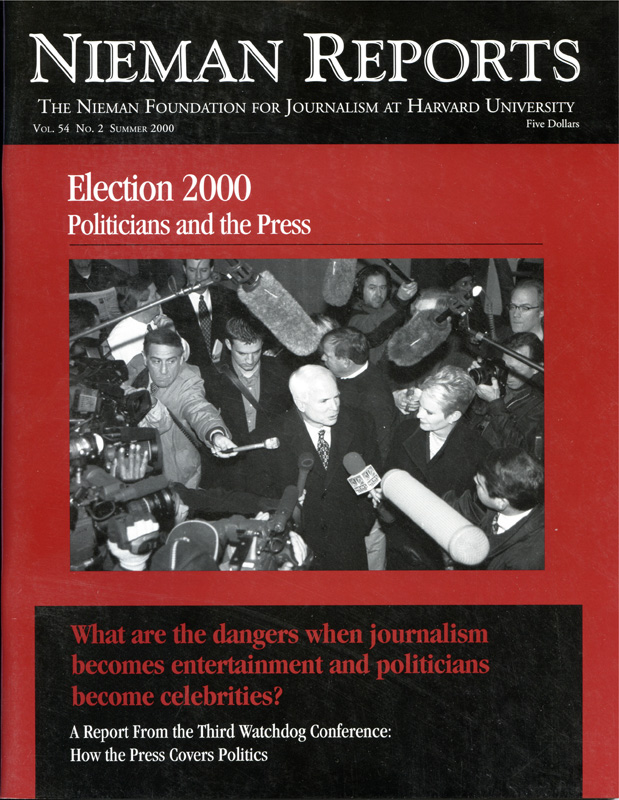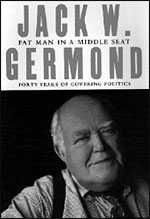When Ronald Reagan was running for President in 1979, Jack Germond’s first close-up view of him was a doozy. It came at a small off-the-record dinner with Reagan, his wife, Nancy, and three Reagan aides. During the dinner conversation, Germond found himself “wondering if these people lived in the real world.”
Now that more than 20 years have passed, Germond feels free to tell the inside story of how the California governor turned conspiratorial and a little loony in discussing presidential politics. And how in eight years as President, Reagan “was always a man with a very loose hold on the real world around him.”
At the dinner, Reagan brought up the case of the FBI detaining a derelict who was in a Los Angeles crowd being addressed by President Carter. Although the derelict had a starter’s pistol in his pocket, there was no evidence he was a threat to the President. But Reagan began wondering aloud if the incident was a put-up job similar to what he believed happened in 1976, the year President Ford defeated him for the Republican presidential nomination.
That year two attempts were made to assassinate Ford, and Reagan figured the attempts were staged for political purposes to create a “sympathy vote” for Ford and deprive Reagan of the Republican nomination. In Reagan’s eyes, the Carter folks might have been staging another incident in a search for a sympathy vote. Even Reagan’s aides, who had arranged the dinner, viewed his ideas as so bizarre that Germond found them staring at either the ceiling or the floor.
The dinner, Germond writes, was “a classic example of political-press symbiosis; they were trying to shape my thinking about Reagan and I was willing to let them in exchange for getting a closer look at the candidate.”
Fortunately for the reader, Germond has used that political-press symbiosis to get a lot of closer looks during his 40 years of reporting politics. As a result, he has written a memoir rich with anecdotes and insights into the politicians he has covered.
And a rollicking 40 years it’s been. Given all Germond’s dining and drinking with politicians—and a superabundant amount of it is recounted in this memoir—he found that sometimes he just couldn’t resist violating journalism’s rule against reporters becoming too cozy with people they cover. Germond even found that Robert Strauss, the wily Democratic leader with close links to the Reagan and Bush Administrations, was such good company that he “couldn’t help but go into the tank” for him.
Germond skirted another journalist’s rule by offering Strauss political advice in the early 1980’s when the Texan was thinking of running for President. Germond discouraged him from running, reminding him he was “a Jew from Texas who had made a lot of money in a lot of deals everybody would be poking into. And more to the point he was a wiseass. If he became a candidate, he would be forever explaining his smart mouth.”
Germond himself comes off as something of a wiseass in some of his razor sharp assessments of public figures he’s covered. He’s especially piercing in assessing George Bush, with whom he admittedly had a personal falling-out during the 1979 campaign after being quoted in The Wall Street Journal as saying of the presidential candidate, “if you hold him up to the light, he doesn’t throw a shadow.” While in Washington, Germond found Bush to be “the most vacuous man to occupy the Oval Office.” In his book Germond variously refers to him as “a wimp,” “an empty suit,” and “a totally amoral campaigner.”
Even Reagan, despite his flights of fancy, looked “10 feet tall” to Germond compared to Bush and Bill Clinton. And so did Jimmy Carter, Gerald R. Ford, Lyndon B. Johnson, and John F. Kennedy, although Richard Nixon’s “felonious conduct puts him in a category beyond comparison.”
Germond writes nostalgically of earlier days when political reporters were hard-drinking and spent countless hours in bars and were mostly males who did their share of womanizing. Many reporters smoked and dropped ashes and butts on floors that had never seen carpeting. One of the few women around his newsroom was a provocatively dressed secretary who would be summoned so reporters could leer at her. He notes wistfully, “today that would be called sexist behavior, but the term hadn’t even been invented then.”
Covering politics was the ultimate assignment in those days, but he believes many of today’s younger reporters see it as just another assignment and not nearly as much fun. They don’t drink as much and when they do it’s white wine or beer rather than Irish whiskey. And he doesn’t discern much womanizing or poker playing.
Although a dedicated print reporter throughout his career, the roly-poly Germond became known nationally with his frequent television appearances, beginning with a 1972 appearance on NBC-TV’s “Meet the Press.” He writes candidly about the “heady experience” of becoming a television celebrity and how it helped him secure fat speaking fees. He found people clamoring for his views and concluded, “you could write your fingers off for 25 years…and never get the kind of hearing you could get from shooting off your mouth on television for a half hour every week.”
As the fat man in the middle seat on “The McLaughlin Group,” a shouting match that provides more heat than light, Germond shot his mouth off weekly for 15 years until a final falling out with John McLaughlin, the show’s pompous and overbearing host.
Germond calls McLaughlin a “loudmouthed bully” and describes several clashes with him, including one in which he upbraided the former Catholic priest after learning he was pocketing up to $10,000 and paying Germond and other panelists only $2,500 for joint lecture appearances. The final clash came at a 1996 luncheon where McLaughlin announced the program was going to be distributed internationally and Germond wisecracked that McLaughlin could now take credit for “dumbing down the whole world.” Although Germond insisted he considered it the usual “McLaughlin Group” banter, McLaughlin was not amused and excluded him from several shows. Germond subsequently resigned.
Germond admits his misgivings about being on a show that many journalists criticize as a food fight and that he describes as “grotesque” some weeks. It risked his reputation as a serious journalist and his friend, The Washington Post’s David Broder, disapproved of his participation. But Germond, like some other journalists, decided it was worth it because of the celebrity factor and the money—$600 a week from the show, plus hefty lecture fees. Would he watch it now that he’s not on it? “No.”
Jack Nelson, 1962 Nieman Fellow, is the Chief Washington Correspondent of the Los Angeles Times.



